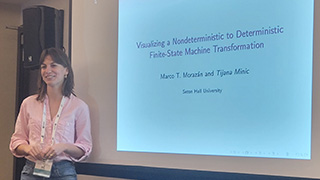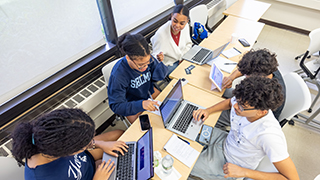Computer Science Professor Marco Morazán and Student Tijana Minic Awarded STEM Undergraduate Research Award
Thursday, May 30, 2024

Tijana presenting her and Morazán's research findings.
After receiving the STEM Undergraduate Research Award in January of 2024, Computer Science Professor Marco Morazán, Ph.D., and double major in Computer Science and Psychology, Tijana Minic set out to create dynamic visualizations for FSM – a programming language designed to help students learn formal languages and automata theory more easily. With the creation of the visualization tools for FSM, students will be able to see theoretical concepts used in programming.
Specifically, their project aims to extend FSM with visualization tools to help students understand the theoretical underpinnings of formally defined grammar. A grammar is used to define a set (much like the English grammar defines the set of valid sentences in English). To determine if a given input is in the set defined, a grammar uses its rules to attempt to derive it. If the derivation is possible then the given input is a member of the set. The work being developed by Morazán and Tijana will allow students to see how grammar rules are used in a derivation. After their development is completed, it is Morazán’s and Tijana’s hope that their software will have a profound impact on how students learn in Morazán’s classroom and beyond using tools to visualize formal statements applied in practice.

Marco T. Morazán, Ph.D.
Despite the high level of work that Morazán demands from his students, Tijana credits his teaching to making her a better problem solver and computer programmer. Admittedly, Tijana found herself struggling with the new material, but the amount of time that Morazán has committed to Tijana’s professional and academic development has allowed her to fully understand complex concepts and grow as a person and as a colleague. This personalized approach to the nurturing of young minds is a core value that makes Seton Hall a premier candidate for higher education. While Tijana has enjoyed the process of pioneering new computer programming methods with Morazán, she applauds Morazán for recognizing her potential. Without the guidance of supportive faculty like Morazán, Tijana says that she "would not be a student of Computer Science, researching, or enjoying this success." This success has, so far, yielded Tijana and Morazán, two co-authored peer-reviewed publications and two additional articles currently undergoing peer-review.
Along with receiving 1-on-1 guidance from globally recognized faculty, the STEM Undergraduate Research Award has also allowed Tijana the opportunity to stay in America over the summer to complete her research. Since Tijana is an international student, she has usually had to complete her research or independent studies during the school year. After receiving this grant, Tijana can stay at school to complete her research while still being able to afford living expenses. In addition to covering the costs of living and research, the STEM Undergraduate Research Award has also provided students with the opportunity to present their findings at academic conferences. An experience that is known to be costly, is now achievable for students like Tijana with this award.
Categories: Research, Science and Technology






